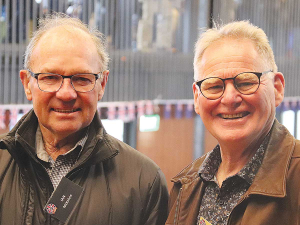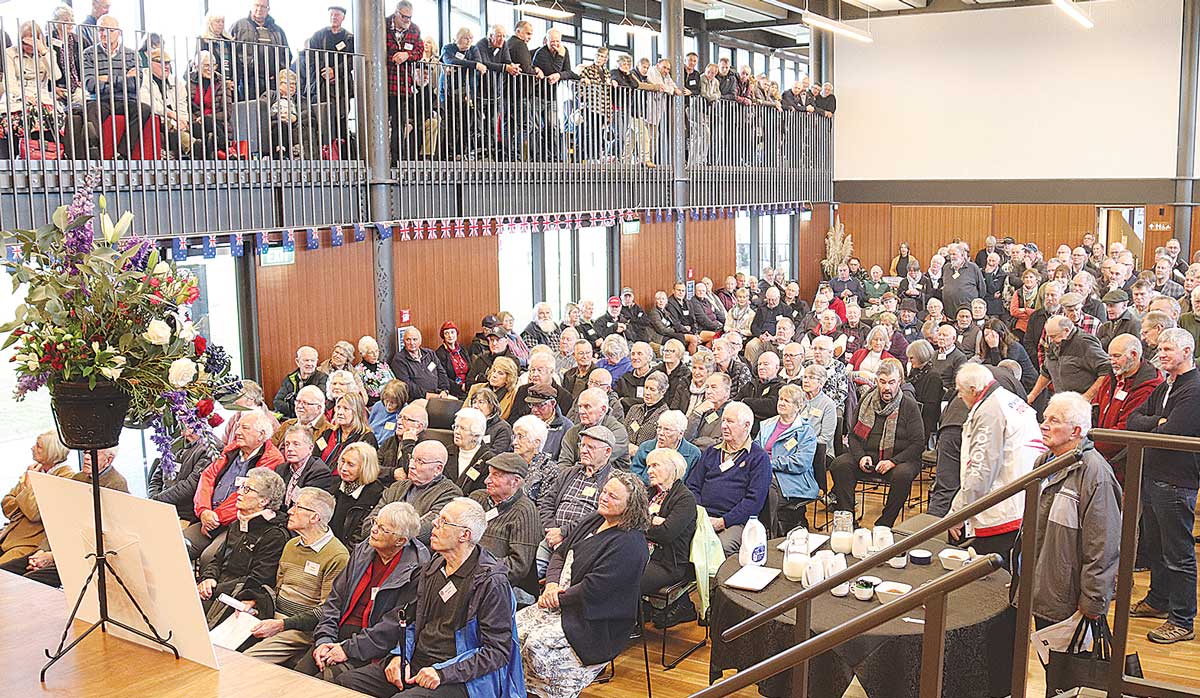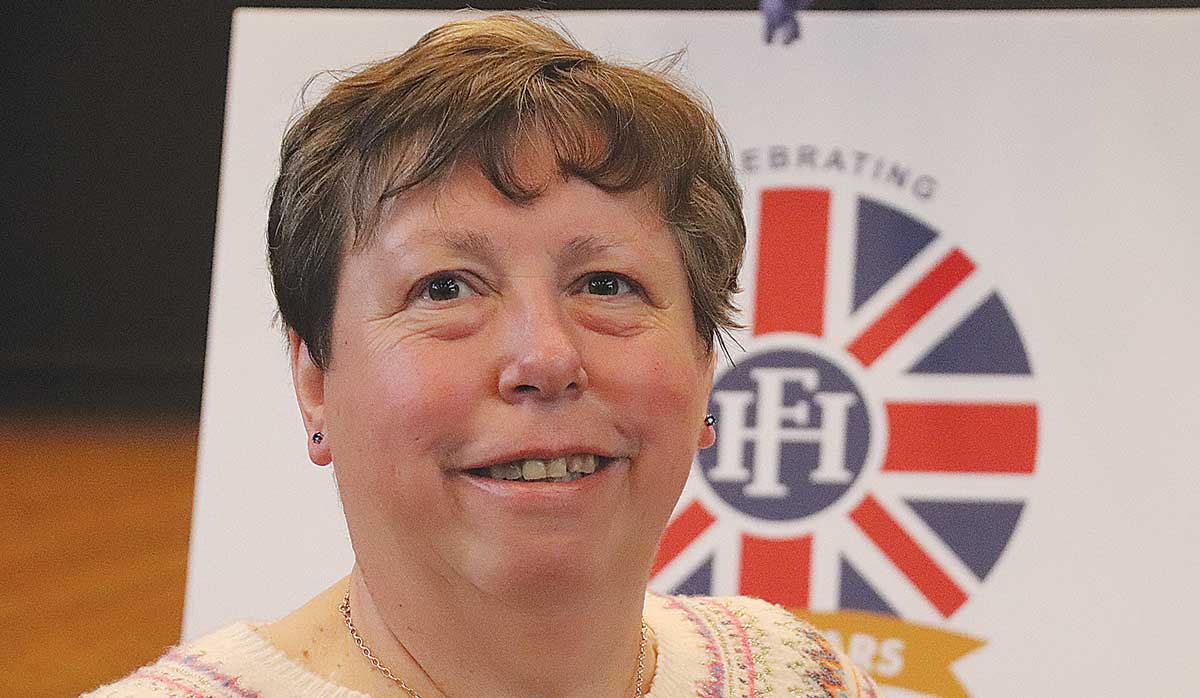Police intercept rogue rural thieves
Quick thinking from members of the public has led Police to stopping a pair of thieves from stealing items from rural mailboxes.
 Flock House reunion committee chair Alasdair Bettles-Hall (right) and former MP Ian McKelvie at the celebrations.
Flock House reunion committee chair Alasdair Bettles-Hall (right) and former MP Ian McKelvie at the celebrations.
A tsunami of memories hit the tiny Manawatū township of Bulls earlier this month where 300 people gathered to commemorate the 100th anniversary of Flock House - an iconic former agricultural training facility.
The local community centre was packed to capacity for the opening of the event as people listened to speeches and quickly moved into groups to reminisce and learn more about this amazing institution, which produced some great farmers.
Flock House owes its origins to NZ wool growers who, during World War I, agreed to a deal with the government of the day to buy their wool and later on-sell it. In the end, the government made a profit of 237,000 pounds sterling on the sales and offered this back to the growers. They felt embarrassed by this and decided to put the money into a fund to help the orphaned sons and daughters of Royal Navy, merchant navy and fishermen who lost their live in the war.
This was in recognition of the navy personnel who took their wool to market or protected the ships that did. The wool growers purchased the Flock House estate in 1922 and converted it into a training institute for the orphans to learn farming skills, the first of whom arrived in 1924.
This continued until 1931, by which time about 750 boys had come to Flock House. It should also be noted that a Girls' Flock House was established in Palmerston North, where daughters of the seamen were trained in cooking and other domestic skills.
In 1937, the government bought the establishment which then offered cadet training in farming to all New Zealanders. It was later used as a conference centre until being sold off by the government in 1988.
It was the descendants of these early arrivals, along with farm cadets and their instructors, who came from across the globe and all parts of NZ to attend this amazing reunion.
The idea of holding the centenary celebrations came from Alasdair Bettles-Hall, whose own father was one of the orphas who came to Flock House in 1929. He says he was reading about Flock House two years ago when it suddenly dawned on him that the 100th anniversary was coming up.
"So quite frankly, in my morning shower the bones of this project came together. Firstly, to tell the stories of the 759 orphans and their descendants and secondly to hold a reunion of all those who had been associated with Flock House over the years," he told Rural News.
The inspirational shower turned into a raging success attended by lots of New Zealanders, a contingent from Australia and one woman from the UK whose great-great-grandfather was one of the original orphans.
Bettles-Hall is extremely modest about his own involvement and credits a great committee, which he chaired, for its success. The reunion involved a gathering in Bulls with opportunities to visit the local museum, which has a feature on Flock House, and a special dinner at the Awapuni Racecourse near the site of the Girls’ Flock House.
The History
Every one of the 300 attendees at the reunion had their own personal or family history stories about Flock House.
One of the more famous was former All Black coach J.J. Stewart who was the principal at the institution from 1969 to 1983. He invited the Minister of Agriculture at the time, Duncan MacIntyre, to open a new hay barn. But much to the surprise of the minister it was a new gymnasium.
One person at the celebrations with special links to Flock House was the former MP for Rangitikei, Ian McKelvie.
“My great great-grandfather came to NZ from Australia in about 1853 where he’d made his money selling meat to the goldminers. He lived in Wellington for a while but in 1854 he bought the original Flock House farm. In 1908 his son Lynn, who’d taken over the farm, built the homestead that stands there today,” he told Rural News.
McKelvie says the farm was sold in 1922 to the trust that established the training institute. He thinks that it may have been for financial reasons.
McKelvie still lives near the property but says it’s a real tragedy that the homestead and the outbuildings have not been maintained. He says the bill for repairing it would be huge: “Even greater than fixing Premier House in Wellington”.
He says it’s a pity that successive governments haven’t had the foresight to preserve places such as Flock House.
He also relates the story about one of the early principals of Flock House, Charles Powels, a muchdecorated military serviceman in WWI who returned to NZ with one of the few horses to come home from the war. The horse was grazed at Flock House and later died there. Every year a special ANZAC commemoration is held near the property for the horse.
 |
|---|
|
Every one of the 300 attendees at the reunion had their own personal or family history stories about Flock House.. |
While Flock House may crumble a little, the history and the tales of what happened over a century will be preserved thanks to Alisdair Bettles- Hall and his team.
They are planning to have a book written over the coming years. Already local historian Russell Poole has begun work by initially writing an excellent article in the Manawatū Journal of History. He says he was initially researching the Girls’ Flock House and then moved onto the establishment at Bulls.
“It’s been wonderful story to write and has been a voyage of discovery for me,” he says.
Visitor from the UK
For Alison Willmott, coming to NZ from Britain especially for this reunion has been a pilgrimage.
Her grandfather came to NZ in 1927 as part of the 11th draft of orphan boys. His father was killed in action when the battleship HMS Good Hope was sunk by the German Navy in the battle of Cornell off the Chilean Coast in November 1914.
 |
|---|
|
For Alison Willmott, coming to NZ from Britain especially for this reunion has been a pilgrimage. |
Willmott says he stayed in NZ for about six years and then returned to the UK to farm and never came back to NZ.
“I think he was one of the very few orphans who returned to the UK,” she says. This was Willmott’s second trip to reconnect with the history of her grandfather. She and her mother came 24 years ago and managed to get a look at some of the archives in the attic at Flock House and even saw a photograph of her grandfather on the wall.
“I feel that I have special links with my great grandfather and grandfather because I was WREN and a reservist in the Royal Navy,” she says.
Willmott says the reunion was special for her and she enjoyed meeting other people with similar memories and stories. She also plans to catch up with some of her NZ relations during her visit.
The 5+ A Day Charitable Trust has launched a collection of affordable recipes designed to turn everyday vegetables into seasonal stars.
Jane Mellsopp has been confirmed as the new Government Appointee to the New Zealand Meat Board (NZMB).
To celebrate the tenth anniversary of its annual Good Deeds competition, Rabobank will give away $100,000 to improve rural community hubs, schools, clubrooms, and marae across New Zealand.
Agricultural and veterinary product supplier Shoof International has appointed Michaela Dumper as its new chief executive.
Federated Farmers is celebrating following the Government's announcement that young farmers will be able to use their KiwiSaver funds to buy their first home or farm.
The Meat Industry Association of New Zealand (MIA) today announced that Chief Executive Officer Sirma Karapeeva has resigned from the role.

OPINION: A mate of yours truly reckons rural Manawatu families are the latest to suffer under what he calls the…
OPINION: If old Winston Peters thinks building trade relations with new nations, such as India, isn't a necessary investment in…